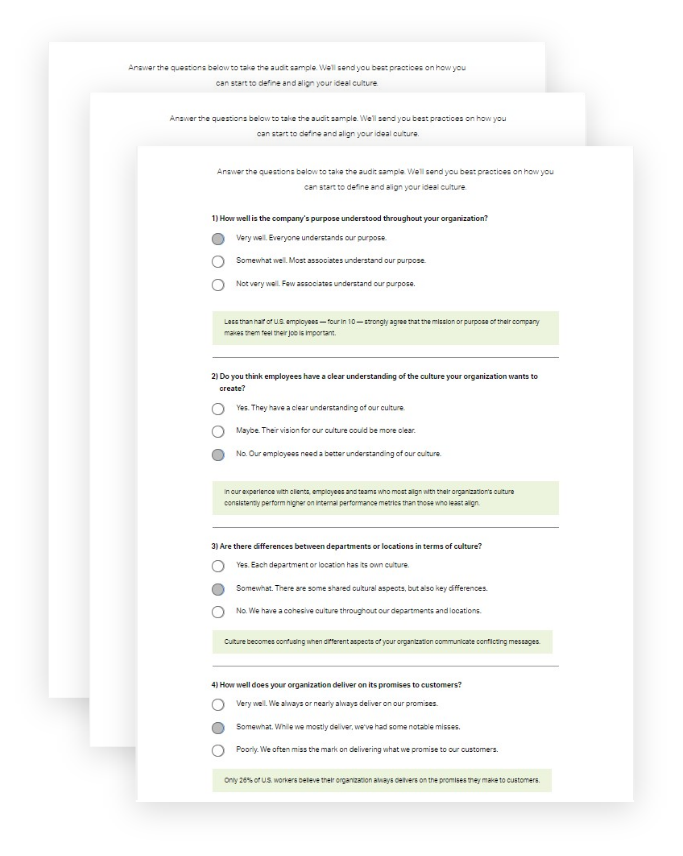Story Highlights
- Disengaged employees cost the world $7.8 trillion in lost productivity
- Quiet quitting starts when your culture fails to deliver on employment promises
Concerns about quiet quitting exist in many leadership circles. Quiet quitting refers to a trend where unmotivated, disinterested, checked-out employees do bare-minimum work at best -- just enough to get the job done but no more.
While "quiet quitting" is a new term, the phenomenon is anything but novel. Disengaged employees have been a long-time -- not to mention expensive -- problem for leaders: Employees who are not engaged or who are actively disengaged cost the world $7.8 trillion in lost productivity, according to Gallup's State of the Global Workplace: 2022 Report. That's equal to 11% of global GDP.
Alarmingly, at least 50% of the U.S. workforce are quiet quitters; in all likelihood, probably more than 50%.
It's easy to understand why quiet quitting is troubling leaders. Yet there's a root cause to quiet quitting that is not currently in the mainstream conversation: broken brand promises.
Does Your Culture Deliver on Your Promises or Disappoint?
In the wake of the Great Resignation, many workplaces are revitalizing their employee value propositions and making promises to their people. For example, some companies assure employees that they'll prioritize worker wellbeing and implement employee assistance programs.
Alarmingly, at least 50% of the U.S. workforce are quiet quitters; in all likelihood, probably more than 50%.
With these promises in place, many employees and job candidates have felt renewed hope, optimism and excitement about what their workplace could provide: flexibility, an inspiring mission and managers who genuinely care about their wellbeing.
But here's the problem: If employees perceive workplace promises as an illusion, it's only a matter of time before hopeful workers become discouraged. Experiences must follow brand promises. Experiences are born of culture. If there's a misalignment between your culture and what your employer brand has promised, employees either leave the organization or quietly do the bare minimum. In the wake of countless resignations, many are now choosing the easier path of smiling and taking the money.
Unfortunately, many organizations struggle to deliver brand promises and create exceptional employee experiences that resonate with each worker. It's a problem that persists across organizations because it's hard work to change a workplace culture.
Put simply, your employer brand is only able to get the best of your people when it's an authentic representation of reality -- what employees experience in your work culture every day. A compelling employee value proposition may get talent in the door, but the only way to engage and retain employees is with a culture and employee experience that consistently reflect brand promises. Your culture is either delivering on your promises or creating quiet quitters.
In fact, a brand that honestly endorses its imperfections and shortcomings is far better than a brand that tries to be more than it truly is. A workplace that is upfront with employees even about what isn't ideal in the culture can keep high performers better than one that seems disingenuous to workers.
Here are three questions to ask yourself to build a culture that delivers on your brand promises and keeps quiet quitting at bay.
1. Can we deliver on what we promise?
What employees want and expect from a workplace has changed over time. Only a generation ago, top talent was most attracted to large, stable organizations. Then, technology and innovation became the new buzzwords, with the most cutting-edge work attracting the best.
Now, people are seeing that life is more than just their job. They want their work to matter. They crave work that does good and is part of a global solution. They want a workplace that offers the opportunity to use their strengths to promote a higher purpose. And they're most engaged in a mission-driven workplace that's taking visible, credible action to do good and make the world a better place.
If there's a misalignment between your culture and what your employer brand has promised, employees either leave the organization or quietly do the bare minimum.
Approaching your brand promises without deeply understanding your culture, no matter how inspiring and well communicated, can only work for so long. The best brands are authentic to what and who your organization is. That is, you need a specific, one-of-a-kind brand that communicates the difference your organization makes, how your company provides that value (your unique capabilities) and the customers you serve.
2. Are we tracking and measuring our culture?
Successful leaders measure and track their culture to ensure that the messages they want to convey get through to their people. To be perceived as real, you need to understand your culture from both logistical and emotional perspectives.
Instead of settling for a vague understanding of your culture, use quantitative and qualitative metrics to fully comprehend the intricacies of employees' experiences and beliefs. What factors motivate people to stay? What key moments convince people this is the right workplace for them? What are the most common experiences that push people away?
When you truly know your culture and the meaningful moments that create the reality of your employee experience, you can make data-driven changes to increase employee commitment.
Remember, a strong culture and employee experience are honest, inspiring, and consistent with a compelling employer brand. In other words, your workplace's inside -- your culture and employees' experiences -- must match its outside -- what your brand promises.
3. Are we doing the work required to change?
To stop quiet quitting, leaders need to take concrete, consistent actions to ensure their culture does what it says it will do. Put differently, your workplace culture should be a priority every day -- and this starts with your managers.
Managers are vital to building a compelling culture because they structure how work gets done, interact with employees regularly and shape people's day-to-day experiences with each other. Managers influence how employees consistently experience their workplace culture. To do this well, they need manager development and leaders who support them.
Your workplace culture should be a priority every day -- and this starts with your managers.
Without great managers who bring your desired culture to life, your employees could become quiet quitters. And while this quiet quitting may seem like a threat -- it's undoubtedly a problem -- it is fixable. The answer is your culture.
Your culture doesn't need to be perfect. But to attract the best and keep talent from quiet quitting, your promises must match the reality of your culture.
Your culture is one of the most important factors in stopping quit quitting:
- Answer these four questions to start thinking about the critical role that your culture plays in your organization's success.
- Read our guide to learn why culture matters and discover what that means for your organization.
- Contact us to talk about transforming your culture and keeping your brand promises.





